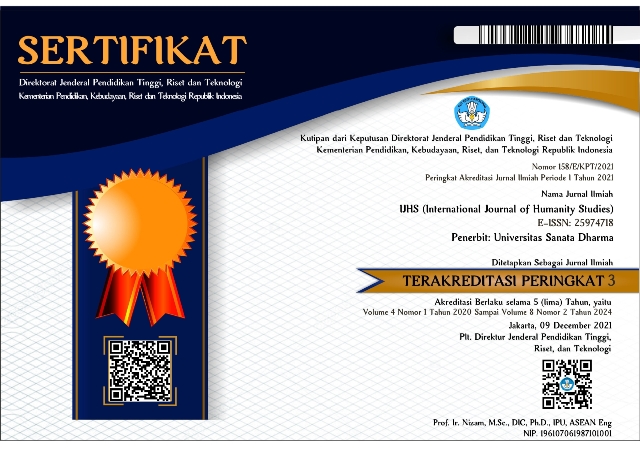WORST OF ALL POSSIBLE WORLDS: DISENTANGLING FROM DYSTOPIAN SPACE AND DEHUMANIZATION IN ROY ARAGONS GANAGAN
(1) University of Northern Philippines
(*) Corresponding Author
Abstract
The war on drugs in the Philippines, despite President Dutertes rhetoric of saving the country, has killed alarming numbers of people. This article analyzes a dystopian text titled Ganagan (Fertilizer) by Roy Aragon which is about the Duterte administrations war on drugs. Deploying close reading and semiotics, it shows that the story portrays the punitive and vindictive nature of the war on drugs as a totalitarian project which resulted in dehumanization and collapse of human values. It further argues that the text suggests a possible future in which Dutertes utopian pursuit of the best of all possible worlds, which has done away with dangerous drugs, is driven less by the search for happiness than by a determined faith in justice. Lastly, the analysis focuses on the vegetable garden which Castas, the main character, has cultivated. Launching off from Edward Sojas trialectics of spatiality and Thirdspace and conventions of dystopian fiction, the article shows that the garden is an ambivalent position, negotiation, and critique of the war on drugs. Hence, the garden, as a lived space, though imposing a desired order, could also be a site of disentanglements and resistance.
Keywords
Full Text:
PDFReferences
Althusser, L. (1971). Lenin and philosophy and other essays. Trans. B. Brewster. New Left Books.
______. (2004). Ideology and ideological state apparatuses. In J. Rivkin and M. Ryan (Eds.), Literary theory: An anthology (2nd ed.). Malden, MA: Blackwell Publishing.
Anderson, J. (2002). Researching environmental resistance: Working through secondspace and thirdspace approaches. Qualitative Research, 2(3), 30121.
Aragon, R. (2017). Ganagan. Facebook, June 5. Retrieved from https://facebook.com/royaragon/.
Armstrong, A. (2017). Michel Foucault: Feminism. Retrieved from http://www.iep.utm.edu/foucfem.
Barber, N. (2013). Why Are Zombies So Popular? http://www.bbc.com/culture/story/20131025-zombie-nation.
Barthes, R. (1997). Toward a Psychosociology of Contemporary Food Consumption. In C. Counihan & P. V. Esterik (Eds.), Food and culture: A reader. New York: Routledge.
Bertens, H. (2014). Literary theory: The basics (3rd ed.). New York: Routledge.
Borch, C. (2002). Interview with Edward W. Soja: Thirdspace, postmetropolis, and social theory. Distinktion: Journal of Social Theory, 3(1), 11320.
Bourdieu, P. (1984). Distinction: A social critique of the judgement of taste. Trans. Richard Nice. Boston, MA: Harvard University Press.
Buchanan, J., & Young, L. (2000). The war on drugsa war on drug users? Drugs: Education, Prevention and Policy, 7(4), 40922.
Certeau, M. (1982). The practice of everyday life. Trans. Steven Randall. California: University of California Press.
Claeys, G. (2017). Dystopia: A natural history, a study of modern despotism, its antecedents, and its literary diffractions. Oxford: Oxford University Press.
Cole, M. B. (2017). Dystopia and political imagination in the twentieth century. PhD dissertation, North Carolina: Duke University.
Francis, M., & Hester, R. J. (1990). The meaning of gardens. Boston, MA: MIT Press.
Foucault, M. (2004). Discipline and punish: The birth of prison. In J. Rivkin & M. Ryan (Eds.), Literary theory: An anthology (2nd ed.). Malden, MA: Blackwell Publishing.
Gordin, M., Tilley, H., & Prakash, G. (2010). Utopia/dystopia: Conditions of historical possibility. New Jersey: Princeton University Press.
Gottlieb, E. (2001). Dystopian fiction East and West: Universe of terror and trial. McGill: Queens University Press.
Gunkel, A. H. (2016). Food and culture. In G. Burns (Ed.), A companion to popular culture. Malden, MA: Wiley.
Human Rights Watch Official Website (2016). Philippines War on Drugs. Retrieved from https://www.hrw.org/tag/philippines-war-drugs.
Lefebvre, H. (1976). The survival of capitalism. Trans. F. Bryant. London: Alison and Busby.
Maes-Jelinek, H. (1991). Wilson Harris: The uncompromising imagination. London: Dangaroo Press.
Massey, D. (2005). For space. California: Sage Publishing.
Perez, M. S. (2018). Re-encodation of GUMIL Hawaii writers association as a diacritic site for Ilocano Hawaiian representation. Proceedings of the 6th Literary Studies Conference, 1112 October 2018, Universitas Sanata Dharma, Indonesia.
Rottenberg, C. (2008). Performing Americanness: Race, class, and gender in Modern African American and Jewish American Literature. New Hampshire: Dartmouth College Press.
Schmid, C. (2008). Henri Lefebvres theory of the production of space: Towards a three-dimensional dialectic. In K. Goonewardena, S. Kipfer, R. Milgrom, and C. Schmid (Eds.), Space, difference, everyday life: Reading Henri Lefebvre. New York: Routledge.
Soja, E. (1996). Thirdspace: Journeys to Los Angeles and other real-and-imagined places. Malden, MA: Blackwell.
DOI: https://doi.org/10.24071/ijhs.v4i2.3026
Refbacks
- There are currently no refbacks.
Copyright (c) 2021 Mark Louie Tabunan

This work is licensed under a Creative Commons Attribution-ShareAlike 4.0 International License.
Indexed and abstracted in:
IJHS Sinta 3 Certificate (S3 = Level 3)
International Journal of Humanity Studies (IJHS) has been nationally accredited Sinta 3 by the Ministry of Education, Culture, Research and Technology of the Republic of Indonesia based on the decree No. Surat Keputusan 158/E/KPT/2021. Validity for 5 years: Vol 4 No 1, 2020 till Vol 8 No 2, 2024

This work is licensed under CC BY-SA.
Creative Commons Attribution-ShareAlike 4.0 International License.
p-ISSN: 2597-470X (since 31 August 2017); e-ISSN: 2597-4718 (since 31 August 2017)
Notice: The opinions expressed in this publication are those of the authors. They do not purport to reflect the opinions or views of the editorial team or publishers.
International Journal of Humanity Studies (IJHS) is a scientific journal in English published twice a year, namely in September and March, by Sanata Dharma University, Yogyakarta, Indonesia.

















